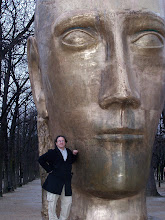I was surprised when I sat down with my program that the Mason Bates piece Liquid Interface was the major work, in terms of length, on this program. After the literal half measure taken earlier this year in programing Danielpour's Zorastrian Riddles, they program two new works in their entirety as the centerpiece between two crowd pleasers.
Leonard Slatkin noted that the theme of this show could be four generations of American composers. Bernstein, the second generation represented here, came first on the program with Three Danse Episodes fromOn The Town. This is Bernstein at his most jazzy and accessible. This was originally music for Broadway after all. I made a flip remark to Markus before the show that his is not Bernstein at his best. I like Bernstein's more serious music, the Chichester Psalms, the Serenade, the symphonies. But Bernstein was good a writing music that straddled different worlds, so I should cut him some slack for these pieces. My worry, or frequent complaint, with this kind of music is about the orchestra being able to produce what I think the composer was going for, In this case, Swing is the key. I really should not have worried about the PSO and Slatkin. Perhaps as this music gets older in relation to the orchestra, that just isn't an issue. Could just be a good collaboration. The music was light, flexible, and fun as it should be for these pieces.
Mason Bates came next with his thirty minute Liquid Interface. This was my first encounter with Bates live (discounting DJ Masonic on Wednesday), and while I listened to some short classical pieces on the internet, almost my first encounter at all. This is programmatic music, ala Debussy and Srauss. The piece, though referencing liquid, is actually about water in all of it's forms. Water is the only substance on Earth that naturally exists in solid, liquid and gaseous forms. The piece starts with glaciers cracking (with sounds sampled from Daniel Grossman's recordings of actual glaciers). This is all accessible music, reminiscent at times of John Adams second generation minimalist music. The second part, sort of a scherzo, moved faster and included more of Mason's live electronica contributions, very non-orchestra kind of sounds, clicks, pops representing water droplets. The third movement is called Crescent City, a New Orleans nickname that was new to me. This connects up with the power of water in the form of a hurricane. It connects with the city through New Orleans Jazz sounds, moving in and around the rest of the music. I could not tell how much of he jazz, if any was sampled and how much played live. This was definitely my favorite part of the piece as I liked the mix of different elements. This build to a climax that became the sounds of the hurricane delivered electronically. The last movement is sort of a coda as the climax is definitely past. This is supposed to represent water evaporating, becoming gas, lighter than air. This makes sense musically and artistically and even emotionally as you may not want to leave us destroyed by a hurricane. It does remind me of the pitfalls of ending a symphonic piece quietly. Just as Brahms Third symphony probably gets less of a ovation than it deserves, audiences do react to where they are when a piece ends. I myself want to hear more from Mr. Bates. He kept my attention and the 30 minutes did not seem like 30 minutes to me.
I am only mildly interested in Richard Danielpour's music as what I had heard prior to this show was well constructed, enjoyable but I did not really engage with it. The third piece on the program and the third generation represented at this show was Danielpour's Pastime. This was his homage to three Negro League Baseball players, Josh Gibson, Jackie Robinson and Henry Aaron. The lyrics were adapted from poems by Michael Harper. Danielpour spoke before the piece was performed and spoke of his own love of baseball, his stint as a batboy for the Atlanta Braves and feeling mentored by Henry Aaron during that time. Perhaps all of those things made this a more engaging piece for me. Perhaps my own love of baseball as a kids and my strong memory of seeing Henry Aaron hit a homerun against my team the Cinncinati Reds at Crosly Field in the late sixties. Baritone Gregg Baker, a mountainous African American singer, delivered the words beautifully. He was a striking figure, towering over Leonard Slatkin even with Mr. Slatkin on the raised podium. I am also not always engaged by vocal classical music but on this occasion, I found the performance quite moving, the most emotionally satisfying part of the evening.
Gershwin was the first generation represented and the last one on this program. His An American in Paris was certainly the best known piece on the program. This was nicely done, fun and enjoyable. For me though, I liked all of the other pieces better. I wonder what the rest of the audience thought about this. Markus did have the same experience of this that I had.
Subscribe to:
Post Comments (Atom)

No comments:
Post a Comment